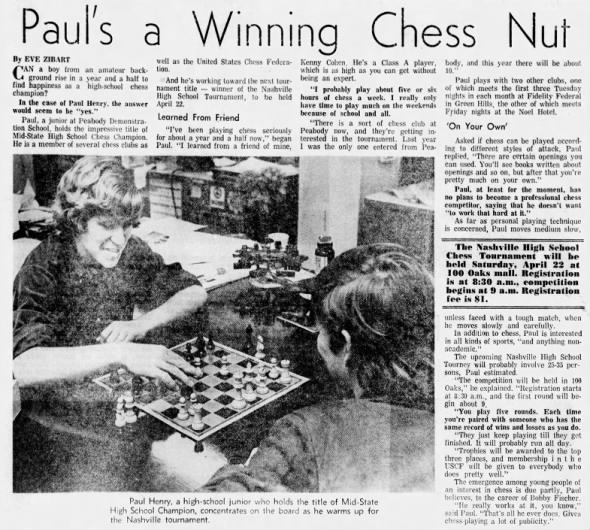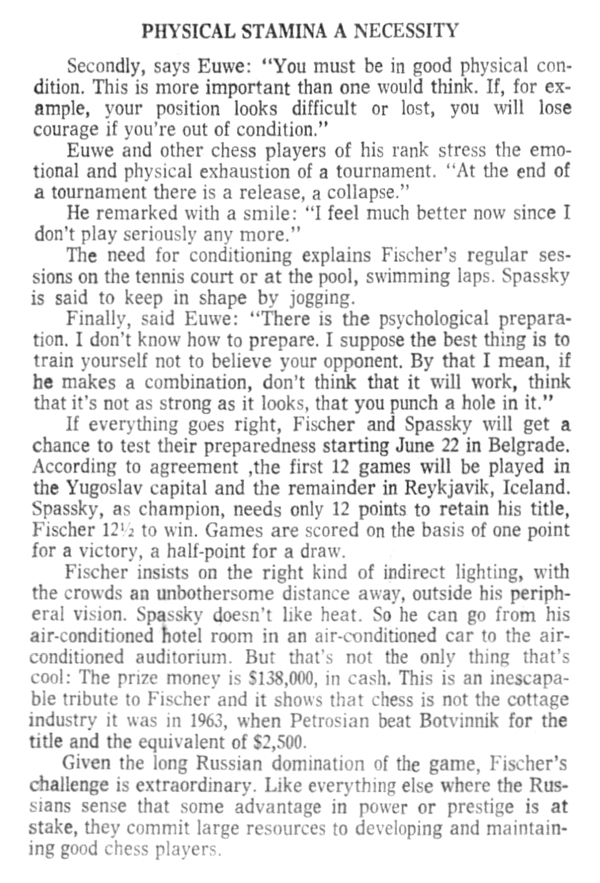Chicago Tribune Chicago, Illinois Sunday, April 16, 1972 - Page 195
Evanston High Players Take Top Chess Plum
“One member of the Evanston team, Robinson, also has picked up pointers from Bobby Fischer, 28, American chess champion who will compete for the world title in June.
Robinson met Fischer In New York earlier this year and since then has played nearly 100 matches with the champion, said Clifford King, Evanston Chess Club president. “He's never won a game against Fischer, but he's learned a lot,” King said.
The Evanston High School team also has been state winner in both the Illinois High School Association and the United States Chess Federation tournaments for the last two years.
Fort Lauderdale News Fort Lauderdale, Florida Sunday, April 16, 1972 - Page 138
Russia, U.S. Gird For Battle Over World Chess Championship
By Stephens Broening Associated Press Writer
Moscow—Yefim Geller draws on his cigarette, then chews on his left thumb for a while. His glance springs momentarily to the man's face across the chess board from him.
Geller rises, moves with uncertain destination around the stage. A dark, overweight man in a rumpled suit, he gives the impression that you could hear him sigh at 30 paces.
He looks in the direction of the people in the October Hall of the Moscow Trade Union headquarters: they might as well have been a hundred stovepipes or so many snowdrifts. He returns to the table and watches the board, as Viktor Korchnoi has been doing for 12 minutes.
Korchnoi coolly measures the collision of forces in the checkered field of tension before him. His fingers flash in the air, and an inert white knight is lowered to the table, a vector suddenly transformed into a lacquered dummy. His hand bangs the stop on his clock. Geller's frail combination has been shattered.
HEADLINES READ: 17 … QBXKT
The papers next day recorded this action as “17 … QBxKT.” They said it was a fine move. It was one of many Korchnoi put together to defeat Geller in the quarter-final challenge round for the world chess championship.
That was months ago. Korchnoi went on to lose to a fellow Russian, Tigran Petrosian, who was defeated in the final round by Bobby Fischer, a 29-year-old American whose ease in disposing of his opponents has lent weight to his claim that he is the uncrowned king of chess. He is determined to end the modern Soviet monopoly on the title when he meets defending champion Boris Spassky in a 24-game match this summer.
“I hate to lose,” Fischer once told an interviewer, “to anybody.” Recalcitrant, unpredictable and single-mindedly dedicated to his own cause, Fischer has the qualities to make a great champion. He is the nearest thing to a popular idol in the long history of the game. His play is always good, frequently brilliant. He creates chess, the experts say.
In Communist Russia, former world champion Mikhail Botvinnik, the “father” of Soviet chess, resorts to the divinity for a metaphor about Fischer's ability: “A gift from God.” the semifinal round, reports: “He always strives for the optimum. He never compromises, but goes all-out to win every single game.”
Dr. Max Euwe, president of the International Chess Federation, considers Fischer may be the best player who ever lived, with the possible exception of Paul Morphy, another American who dominated the game last century. Is Spassky worried?
“Of course he is,” one of Moscow's park-bench players replies without hesitation.
But Viktor D. Baturinsky, director of the Moscow Chess Club, is more circumspect. Like most Russians in official positions, he speaks to foreigners as if he will have to pay for any misstep:
“Fischer, of course, has had a fine streak of play, and we are aware of that. But you mustn't forget that Spassky is an experienced player with proven resourcefulness. Chess is the Soviet national sport, which develops many valuable qualities in a man and improves his general cultural development as well. After the October revolution…”
And so on.
SPASSKY KEEPS TRAINING SECRET
Just how is Spassky preparing for the encounter? Fischer went to the Catskills and can be seen. A request for an interview with Spassky was forwarded, as the rules require, to the Soviet Foreign Ministry, with not so much as a reply. Spassky did tell a Pravda man who asked him last year how he would train for the match: “Sorry, but that's a secret.”
Secrecy is another national sport.
Dr. Euwe, himself a former world champion, explained to a reporter on a recent trip to Moscow what was involved in training for a match like this one.
“First of all,” he said, “there is the technical preparation. Each player tries to develop variations on openings which are not in the book. It is sometimes possible to gain victories this way. But it means creating, adding something to chess theory.”
In practice, it means confronting an adversary with some position he is not prepared for, sending him scurrying to ransack his memory for the proper reply to an old, and maybe forgotten, variant, or forcing him to answer, unready, to a new one. In both cases time and emotional energy are expended.
It is taken for granted that a player of Fischer's or Spassky's accomplishment has mastered the thousands of variations which repeat themselves in tournament play. Perhaps it was this aspect of preparation which prompted the Austrian grand master, Rudolph Speilmann, to declare: “A chess player sheds tears the world does not see.”
PHYSICAL STAMINA A NECESSITY
Secondly, says Euwe: “You most be in good physical condition. This is more important than one would think. If, for example, your position looks difficult or lost, you will lose courage if you're out of condition.”
Euwe and other chess players of his rank stress the emotional and physical exhaustion of a tournament. “At the end of a tournament there is a release, a collapse.”
He remarked with a smile: “I feel much better now since I don't play seriously any more.”
The need for conditioning explains Fischer's regular sessions on the tennis court or at the pool, swimming laps. Spassky is said to keep in shape by jogging. Finally, said Euwe: “There is the psychological preparation. I don't know how to prepare. I suppose the best thing is to train yourself not to believe your opponent. By that I mean, if he makes a combination, don't think that it will work, think that it's not as strong as it looks, that you punch a hole in it.”
If everything goes right, Fischer and Spassky will get a chance to test their preparedness starting June 22 in Belgrade. According to agreement the first 12 games will be played in the Yugoslav capital and the remainder in Reykjavik, Iceland. Spassky, as champion, needs only 12 points to retain his title, Fischer 12½ to win. Games are scored on the basis of one point for a victory, a half-point for a draw.
Fischer insists on the right kind of indirect lighting, with the crowds an unbothersome distance away, outside his peripheral vision. Spassky doesn't like heat. So he can go from his air-conditioned hotel room in an air-conditioned car to the air-conditioned auditorium. But that's not the only thing that's cool: The price money is $138,000, in cash. This is an inescapable tribute to Fischer and it shows that chess is not the cottage industry it was in 1963, when Petrosian beat Botvinnik for the title and the equivalent of $2,500.
Given the long Russian domination of the game, Fischer's challenge is extraordinary. Like everything else where the Russians sense that some advantage in power or prestige is at stake, they commit large resources to developing and maintaining good chess players.
The Tennessean Nashville, Tennessee Sunday, April 16, 1972 - Page 118
Paul's A Winning Chess Nut
The emergence among young people of an interest in chess is due partly, Paul believes, to the career of Bobby Fischer. “He really works at it, you know,” said Paul. “That's all he ever does. Gives chess-playing a lot of publicity.”
 Paul's A Winning Chess Nut Sun, Apr 16, 1972 – Page 118 · The Tennessean (Nashville, Tennessee) · Newspapers.com
Paul's A Winning Chess Nut Sun, Apr 16, 1972 – Page 118 · The Tennessean (Nashville, Tennessee) · Newspapers.com
The Sydney Morning Herald Sydney, New South Wales, Australia Sunday, April 16, 1972 - Page 7
Australia May Get Big Chess Game
By a Special Reporter
Australia has less than a week to bid for the 1972 world chess championship, which is being billed as the chess match of the century.
President of the World Chess Federation Professor Max Euwe confirmed in Perth last night that Australia has a chance of staging the match between American Bobby Fischer and Boris Spassky, of Russia.
But, he said, “Australia will have to make up its mind quickly…within the next two or three days.”
Good chance
Professor Euwe, who leaves today after a chess promotion tour, has been forced to seek a new venue following a decision by Yugoslavia not to stage the first 12 games of the match.
The championship, worth $138,500, must start by June 22.
It's understood the Australian Chess Federation would need about $110,000 to stage the match.
Chess officials say sponsors would be able to recoup this through television rights and copyrights of the actual games.
Professor Euwe originally gave the federation 48 hours in which to make up its mind. But the deadline was extended last night.
Holland, West Germany and France are also in the running for the match.
“But I would like to see it come to Australia. It would be a great boost for chess here,” said Professor Euwe, who will have the final say on the venue.
Professor Euwe, a 70-year-old Dutchman and the last non-Russian to hold the world chess title, said the match would not automatically go to Australia.
“If Holland, West Germany and France don't want to stage the match, then Australia would have a good chance.
“If all four say ‘yes’ a number of things will have to be taken into consideration,” he said.
Professor Euwe said the championship would not “simply go to the highest bidder.”
“All that have to be fulfilled are the original conditions agreed to by Yugoslavia,” he said.
New York Times, New York, New York, Sunday, April 16, 1972 - Page 28
Doubt Voiced on Funds For Top Chess Match
The Hague, the Netherlands, April 15 — Wim Ruth, chairman of the Dutch Chess Union, said tonight it was highly unlikely that his organization could raise the necessary prize money for the first half of the match between Bobby Fischer and Boris Spassky for the international chess championship.
The Dutch Chess Union was asked to take over organization of the match yesterday by Hendrik Slavekoorte, secretary of the International Chess Federation.
The federation, which has its headquarters in Amsterdam, turned to the Dutch Chess Union after Belgrade withdrew its $150,000 offer to be host city for the first half of the match.
Mr. Ruth, who blamed “Fischer's financial chicanery for all the problems,” said that “convincing sponsors to raise the necessary prize money seems an impossible task.”






























